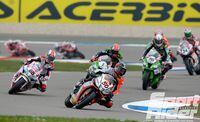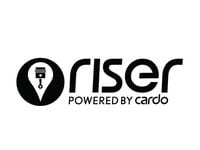After a long, iterated gestation of the current regulations, WSBK is keen to lay down the foundations for next year's championship as quickly as possible. Talks between FIM, Dorna and manufacturers have begun in Phillip Island and carried onto Aragon and Assen. A draft of the 2015 rulebook, with the entire top class switching to EVO configurations, is likely to be released in the next few weeks. Meanwhile, several points appear to be already agreed upon, both in terms of engine and electronics.
As for the former, the EVO class currently allows only minor modifications, basically following the Superstock specifications. Next year, however, teams will have more tuning freedom. Philosophically, the goal is to preserve the balance among constructors and thus give incentive to the teams and manufacturers to renew their commitment to the series. In general, future regulations will allow for the modification of the cylinder head, including intakes, valves, springs and cams, similarly to the Supersport rules. Crankshaft and connecting rods, however, should be left untouched or only substituted with components made of different materials but weighing as much as the original.
Electronics, on the other hand, are still under discussion. Different sources in the paddock hinted at the fact that ride-by-wire will remain available even for models that are not fitted with it originally, but negotiations regarding the ECU and software are ongoing. The current regulations (article 2.4.9.1) say that teams can use the production unit with the possibility of re-writing the software, or a different unit approved by the manufacturer whose price (including software, sensors, and wiring) does not exceed 1.5 times the original. Now the organizers are pushing toward a single price cap for electronics, still to be defined, which includes ECU, software, sensors, wiring and dashboard.
Price caps are already applied to suspensions and brakes, and will be kept in effect. Similarly, the retail prices of the bikes to be homologated cannot exceed the €40,000 Euro mark ($55,000). That said, homologation requirements are likely to drop down. Currently, the rulebook asks a manufacturer to produce 250 units before the end of its first year in the championship and 1,000 before the end of the second. The latter figure is expected to drop down, in light of the economic crisis, to five hundred. Next week, in Imola, more steps toward the future WSBK will be made.


/cloudfront-us-east-1.images.arcpublishing.com/octane/EJ6KZRGAYBCVXNL2PJXL37UVWQ.jpg)
/cloudfront-us-east-1.images.arcpublishing.com/octane/AAN4TI76M5H5JMUVEIGASWXBDU.jpg)
/cloudfront-us-east-1.images.arcpublishing.com/octane/P3RXD2UCPFF37CMB7CHPVKXORY.jpg)
/cloudfront-us-east-1.images.arcpublishing.com/octane/VZEG2EJI2RDFZNHLRZMU56MD3Q.jpg)
/cloudfront-us-east-1.images.arcpublishing.com/octane/GVJQO5FFOFBWNGODOBRB4FBAW4.jpg)
/cloudfront-us-east-1.images.arcpublishing.com/octane/BIVAK2SFIBDJJM25E7I5VU2FJE.jpg)
/cloudfront-us-east-1.images.arcpublishing.com/octane/CH5VX52UG5CFHOVH5A6UYEFWWA.jpg)
/cloudfront-us-east-1.images.arcpublishing.com/octane/ZVGJNGZRU5C33N7KN23BBFKSC4.jpg)


/cloudfront-us-east-1.images.arcpublishing.com/octane/CZ5OM3E43ZEXJHY7LCYXCHLIKI.jpg)
/cloudfront-us-east-1.images.arcpublishing.com/octane/DF5T4K5KPZFJXFCTGPYR77PKJM.jpg)
/cloudfront-us-east-1.images.arcpublishing.com/octane/RMCT2KVQBJHBZMRTSLOVPMOILU.jpg)

/cloudfront-us-east-1.images.arcpublishing.com/octane/K45KB2XHQVA65DX7VN4ZSMT2BI.jpg)
/cloudfront-us-east-1.images.arcpublishing.com/octane/FNHXQQ56BRD7TO4YIJ453PNG2M.jpg)
/cloudfront-us-east-1.images.arcpublishing.com/octane/OIKJC4JA3ZH7BMKUGWYKBIY5FA.jpg)
/cloudfront-us-east-1.images.arcpublishing.com/octane/MT2SAEWY6FDXFBYSLDE3AEFDTM.jpg)
/cloudfront-us-east-1.images.arcpublishing.com/octane/66UPKPYVURBPRCP5HXSN56MEMM.jpg)
/cloudfront-us-east-1.images.arcpublishing.com/octane/EOREGDSRKFDCRJC6K3EDVHBGCE.jpg)
/cloudfront-us-east-1.images.arcpublishing.com/octane/42RF63Q3LVCMBP3DGTWXFYSMOA.jpg)
/cloudfront-us-east-1.images.arcpublishing.com/octane/XNVY3EVWZFCEVPUGJGAN633LXE.jpg)
/cloudfront-us-east-1.images.arcpublishing.com/octane/2PLTVHXY7FDSPFHKU5CFOC43ZY.jpg)